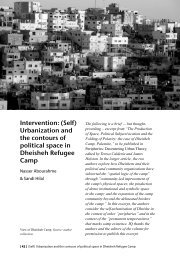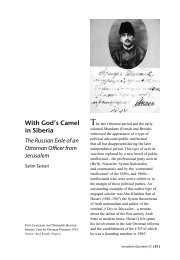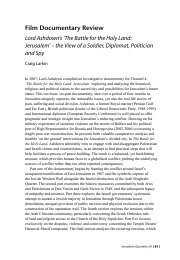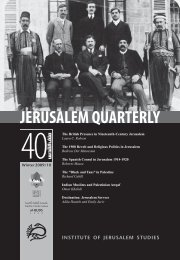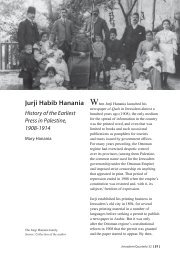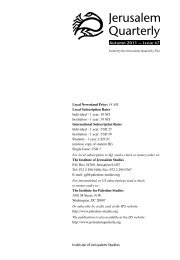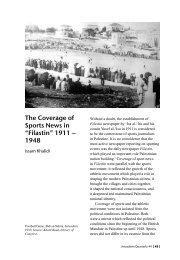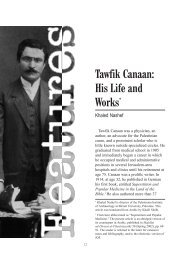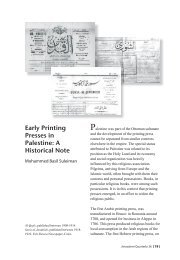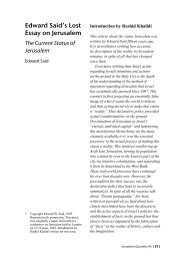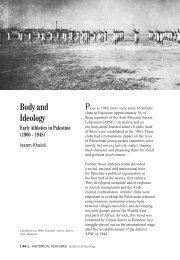INSTITUTE OF JERUSALEM STUDIES - Jerusalem Quarterly
INSTITUTE OF JERUSALEM STUDIES - Jerusalem Quarterly
INSTITUTE OF JERUSALEM STUDIES - Jerusalem Quarterly
You also want an ePaper? Increase the reach of your titles
YUMPU automatically turns print PDFs into web optimized ePapers that Google loves.
degree of influence upon administrative and government officials in <strong>Jerusalem</strong>,<br />
Damascus, and Istanbul.<br />
This study will discuss the means by which <strong>Jerusalem</strong>’s effendiya (intellectual capital<br />
holders), including scholars and notables, bolstered their influence among the people<br />
and acted as intermediaries between them and the state and its agencies. This upper<br />
class of the city’s residents formed relations of cooperation and cultural exchange with<br />
Ottoman state officials on the one hand, while remaining an organic part of the local<br />
population and culture on the other. This special status allowed them to play the role of<br />
an intermediary and acclimatize to political changes, utilizing these changes to serve<br />
their own interests.<br />
Urban Ottoman society was a natural continuation of the structure of Islamic urban<br />
life, both socially and culturally. Most historians have divided such societies into<br />
two separate groups. 1 These two groups are the rulers, including military officials,<br />
administrators and scholars, who were responsible for governance; and subjects or<br />
taxpayers both Muslim and from the dhimma community who did not participate in<br />
governance or administration.<br />
Scholars, then, were close to state officials throughout Islamic history including the<br />
Ottoman period, when they held the respect of government authorities, foremost the<br />
sultan. In the empire’s golden age during the sixteenth century, the measure for the<br />
respectability of scholars and their positions was their acquisition of knowledge and<br />
humble lifestyles, ostensibly led in the custom of the pious forefathers. To encourage<br />
education and culture in the Ottoman state, the sultan and his most powerful ministers<br />
offered grants and awards to educational institutes and the top scholars running them.<br />
Religious endowments were allocated for schools and scholars were exempt from<br />
paying taxes. Their money and property was protected from seizure, contrary to<br />
conditions for military officers and government and administrative officials.<br />
Yet scholarly and judicial institutions were not spared when the Ottoman state and its<br />
administrative agencies began to decline in the seventeenth century. The corruption<br />
and bribery that spread throughout the government apparatus in the Ottoman capital<br />
also entered the offices of the Shaykh of Islam, judges, and other top scholars. Money<br />
and personal connections became the most important factors in making scholarly<br />
appointments. What was happening in Istanbul and major state capitals spread to<br />
the districts and fringe areas like <strong>Jerusalem</strong>: some families succeeded in controlling<br />
administrative and scholarly posts and in fact monopolized them, transferring them to<br />
family members through inheritance.<br />
In the eighteenth century, the monopolization of scholarly posts reached its apex<br />
in large and small cities, beginning with the Ottoman capital Istanbul. During that<br />
century, 24 individuals were appointed to the post of Shaykh of Islam, 17 of which<br />
[ 6 ] HISTORICAL FEATURES Scholars and Notables


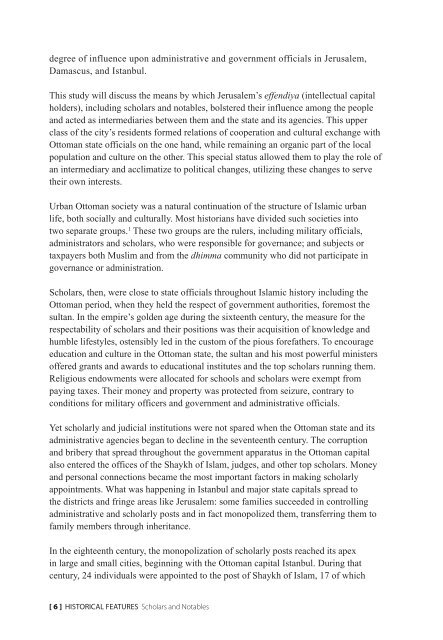
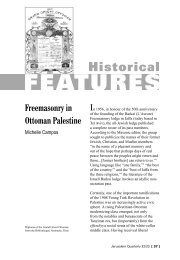
![In Search of Jerusalem Airport [pdf] - Jerusalem Quarterly](https://img.yumpu.com/49007736/1/180x260/in-search-of-jerusalem-airport-pdf-jerusalem-quarterly.jpg?quality=85)
